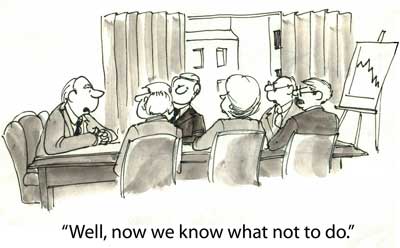Categories
Archives
Search
Subscribe to Our Monthly Digest

Effective leaders are good repeaters
“Men must be taught as if you taught them not, and things unknown proposed as things forgot”
-Alexander Pope
Have you ever heard someone say, “I told them once and I shouldn’t have to tell them twice!”? In his book, “The motive”, Patrick Lencioni makes the point that CEOs often need to be “CRO’s. That means Chief Repeating Officer.
When I was in my early 20’s, I was going through sales training. I was fortunate to have a mentor coach who truly cared about me and wanted me to succeed. Like any good trainer, Mark believed in sticking to the fundamentals.
For my first couple months, Mark joined me on my sales calls. There were several instances where I overlooked a fundamental he had already taught me, and that weakened my sales presentation. After each call we would do a brief review. When Mark needed to correct me, he did so as if it were the first time he was telling me. He didn’t start out with, “Look Steve, like I told you before… Instead he simply repeated the fundamental as if it was the first time I had been told. I will never forget his caring and gentle persistence. Hardly a day goes by that I don’t remember Mark and something he taught me…with relentless tenacity. If we want to be strong coaches we need to stay in there with people and utilize the power of repetition.

A professional approach that builds trust
Here’s a question for you: What is the difference between “nagging” and “gentle persistence”? I am not sure I have the exact answer. I do know that when someone nags me, I can get irritated, yet if they persist in a gentle and gracious way, I am much more motivated.
A couple years ago I sent an email to a person in a marketing company. He was doing a project for me, and I had something I wanted to add. When I wrote Jason, I forgot to copy the president – something which I had agreed to always do. A short time later, I received this email from the president:
“Hi Steve: Just a friendly reminder to “cc” me when requesting projects from the staff. I really don’t mind, but if I know they are working on a project for you, I won’t interrupt them with other projects if i can avoid it. Thanks, J
I was impressed. Not only was the approach friendly and respectful, she took the time to state the WIFM. (What’s in in for me) I was not upset by this email. Quite the contrary, I was upset with myself for the error of omission. I promised myself I would stick to my commitment and always “cc” the president. I have kept that commitment.
This was a good approach that received my full cooperation. What if the email had a nasty tone like “As mentioned previously, I expect a “cc” when…” The president chose the high road. She was probably irritated that I forgot, then quickly shifted to solving the problem. That’s professionalism!

Learn from mistakes…grow from successes
I have coached and trained almost my entire career. Helping others achieve growth means leading people out of their comfort zones so that they may enjoy a desired new ability. Here is a key fundamental: We learn from our mistakes and we grow from our successes. I share this example:
A couple weeks ago on Christmas day a neighbor boy came to our door and asked if he could use our driveway to practice learning to ride his new bike. His driveway led into the street, and ours ended in our yard…much safer!
He mounted his new bike with his sparkling spokes and was ready to take the plunge. Since I spend so much time coaching people, I couldn’t resist offering a couple tips: First, I had him start with the right pedal up so that he could get a good start. Second, I encouraged him to pedal hard while looking straight ahead. Don’t look down! He took off and was tempted to look down. I stopped him and yelled, “Keep looking straight ahead!” He did. He had a success and made it all way to the end of the driveway. We repeated it three times, and we had three good outcomes. There were no falls. He was excited, and ran in to tell his Mom and Dad.
My goal in coaching him was not to have him learn by mistakes, rather to grow from his successes. Let’s face it, falling off a bike isn’t too motivating for most people. The lesson learned here is while we may learn from our mistakes, we grow from our wins. Think about it: If the only way we learned was from making mistakes, then the person in Illinois who had the most traffic accidents would be considered the best driver. Would you want to drive with him/her?

Growth-oriented teams are not afraid to make mistakes
Several years ago I was working with a successful business owner (Joe) who was looking to expand his business considerably. He knew that meant hiring more people, and counting on them to be an extension of his beliefs in hard work, integrity, and doing things with excellence.
 Moving forward, there was one thing that bothered Joe…Mistakes! When members of his team made a mistake, there was a tendency to blame others, make excuses, or “sugar coat” things. When any of these things would happen, solving the problem would become more difficult and the consequences would be more serious. Joe asked me to help him understand the resistance of his team members to own up to mistakes and report them quickly.
Moving forward, there was one thing that bothered Joe…Mistakes! When members of his team made a mistake, there was a tendency to blame others, make excuses, or “sugar coat” things. When any of these things would happen, solving the problem would become more difficult and the consequences would be more serious. Joe asked me to help him understand the resistance of his team members to own up to mistakes and report them quickly.
After talking with Joe’s team members, the cause of this problem became very apparent: Joe’s team was afraid to admit it when they made a mistake, and this fear caused them to hesitate coming forward. Joe is a “right-right” person and when his team members fell short with a customer, he would go into a fit.
When I reported my findings back to Joe, he said, “When I have a tantrum, I am not upset at someone, I am just mad we fell short with a customer.” I replied, “That may be so, but your people think you are mad at them.” Problem solved! We had a team meeting and Joe explained to his team what he had told me. His staff agreed to give Joe permission to have a tantrum when a mistake was made. Once he is finished letting off steam, they all get busy and solve the problem. Joe’s people are now quick to own up to to their errors and communicate them right away. These changes have led to a stronger, more confident, and collaborative team. They also have more fun!

Keep your team accountable
“The reason there were so many heroes at the Alamo is that there was no back door”
Whether we are a parent, boss, or in charge of a team, we need to be a good teacher. What do good teachers do? You remember. Think of our favorites growing up. They believed in us, they wanted us to grow and prosper, and they would not let us sell ourselves short. We don’t do much growing in our comfort zone.
There are two types of delegation: One is designed to increase someone’s ability and confidence, and the other is for work distribution.
When I was in 5th grade, my teacher, Mrs. McGinness delegated a project to me. She appointed me editor of the class yearbook. It was a big project, and I didn’t think I could do it. Mrs. McGinness made me believe that I could.
To get started, I needed to break the job into “bite-size” chunks. If I hadn’t, it would have been overwhelming. I shared this list of tasks with Mrs. McGinness, and she directed me to put deadlines on each one. Then she checked in with me on each deadline to make sure I didn’t run into a snag. Losing steam was not an option. There were times when I got overwhelmed, and wanted her to help with the load. Nope. It was my “baby” she told me. I persevered and, if I may say so, did a pretty good job. Mrs. McGinness knew the magic phrases that kept me accountable and prevented her from “buying it back” Here were a few:
- I know you can do it…
- I am counting on you, Steve…
- What is your new plan of action?
- What are you going to do about it now?
- What is plan B?
Mrs. G kept me moving forward. That is what strong leaders do!
